The 15 best camera lenses of 2025 give you the power to capture stunning, professional-grade photos. From the compact and versatile Canon RF70-200mm F2.8 L IS USM to the telephoto beast Canon RF100-400mm F5.6-8 IS USM, these lenses let you explore a wide range of subjects and shooting styles. With advanced features like fast autofocus, optical image stabilization, and impressive apertures, you’ll be able to create images that truly stand out. If you want to dive deeper into the top camera lenses of 2025, read on.
Key Takeaways
- The Canon RF70-200mm F2.8 L is USM lens offers a bright F2.8 aperture, compact design, and advanced optical image stabilization for professional-grade photos.
- The Tamron 17-70mm f/2.8 Di III-A VC RXD lens provides an impressive 4.1x zoom range, outstanding optical performance, and effective image stabilization for versatile photography.
- The Canon RF100-400mm F5.6-8 is USM lens combines a versatile 100-400mm zoom range with a compact, lightweight design and optical image stabilization up to 6 stops.
- The Tamron 70-300mm F/4.5-6.3 Di III RXD lens offers a compact and lightweight design, equivalent field-of-view of 105-450mm on APS-C cameras, and quiet, precise autofocus.
- The High-Power Telephoto Zoom Lens for Canon DSLR Cameras, with a 420-1600mm focal range and f/8.3 aperture, delivers powerful telephoto performance for wildlife and sports photography.
Canon EOS Rebel T7 DSLR Camera with 2 Lenses
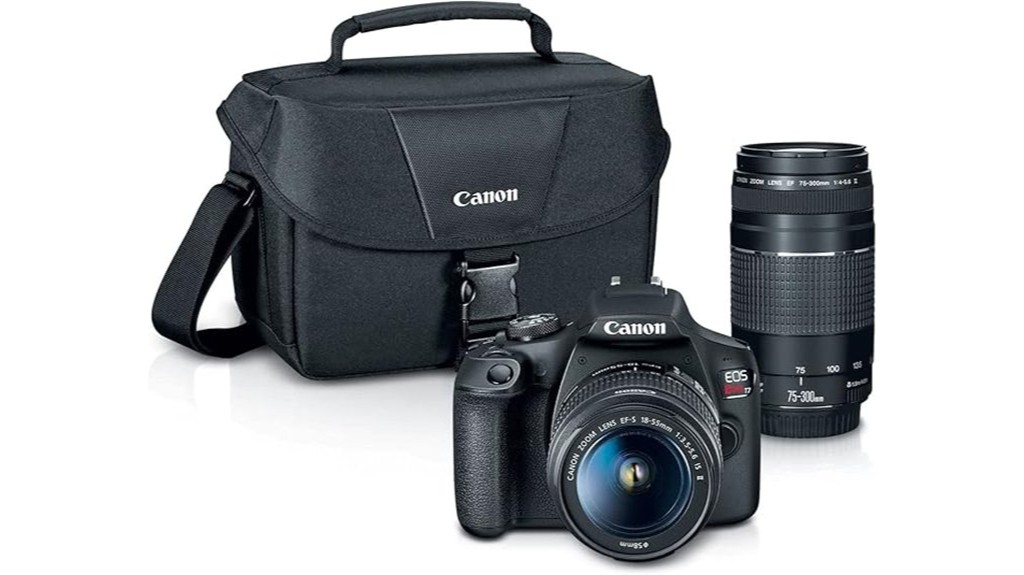
If you’re looking for an affordable DSLR camera that can capture stunning images, the Canon EOS Rebel T7 DSLR Camera with 2 Lenses is a fantastic choice. Boasting a 24.1MP CMOS sensor, it delivers high-quality photos and full HD 1080p video. The 9-point AF system and AI Servo AF guarantee sharp focus, while the built-in Wi-Fi and NFC simplify image sharing. The kit includes two versatile lenses – an 18-55mm and a 75-300mm – providing the flexibility to capture wide landscapes or close-up portraits. Operating in temperatures from 32-104°F, the Rebel T7 is a reliable companion for your photographic adventures. With a 30-day return policy and product warranty, this camera kit offers excellent value for the price.
Best For: The Canon EOS Rebel T7 DSLR Camera with 2 Lenses is best for hobbyist photographers looking for an affordable and versatile DSLR kit.
Pros:
- 24.1MP CMOS sensor for high-quality photos and 1080p video
- Includes two versatile lenses (18-55mm and 75-300mm)
- Built-in Wi-Fi and NFC for easy image sharing
Cons:
- 9-point AF system may not be as advanced as more expensive models
- Limited ISO range compared to higher-end DSLRs
- Optical viewfinder has only 95% coverage
https://www.amazon.com/dp/B0101RW3QK
Canon EF 50mm f/1.8 STM Lens
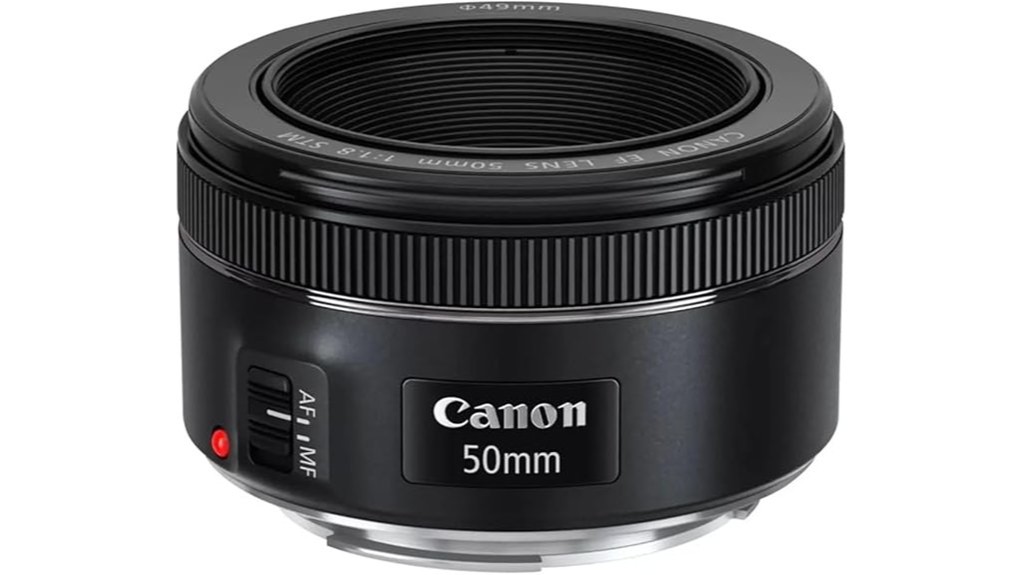
The Canon EF 50mm f/1.8 STM Lens is a prime choice for those seeking a versatile and affordable option for portraits, low-light photography, and cinematic videos. With its bright f/1.8 aperture, this compact lens delivers impressive low-light performance and beautiful bokeh. The updated design and coatings guarantee excellent color and reduced ghosting. Autofocus is near-silent and smooth, thanks to the STM motor, making it ideal for video use. Whether you’re shooting with a full-frame or APS-C camera, the 50mm focal length provides an effective field of view that’s perfect for a variety of applications. This lens is a must-have for any budding or seasoned photographer’s kit.
Best For: The Canon EF 50mm f/1.8 STM Lens is best for photographers looking for a versatile, affordable, and high-quality prime lens for portraits, low-light photography, and cinematic videos.
Pros:
- Bright f/1.8 aperture for excellent low-light performance and shallow depth of field
- Smooth, near-silent autofocus thanks to the STM motor, ideal for video use
- Excellent image quality with reduced ghosting and flare
Cons:
- Relatively narrow field of view on APS-C cameras
- Build quality is not as robust as some more expensive lenses
- Limited manual focus control
https://www.amazon.com/dp/B00X8MRBCW
Altura Photo 58MM Tulip Flower Lens Hood for Canon EOS DSLR Cameras
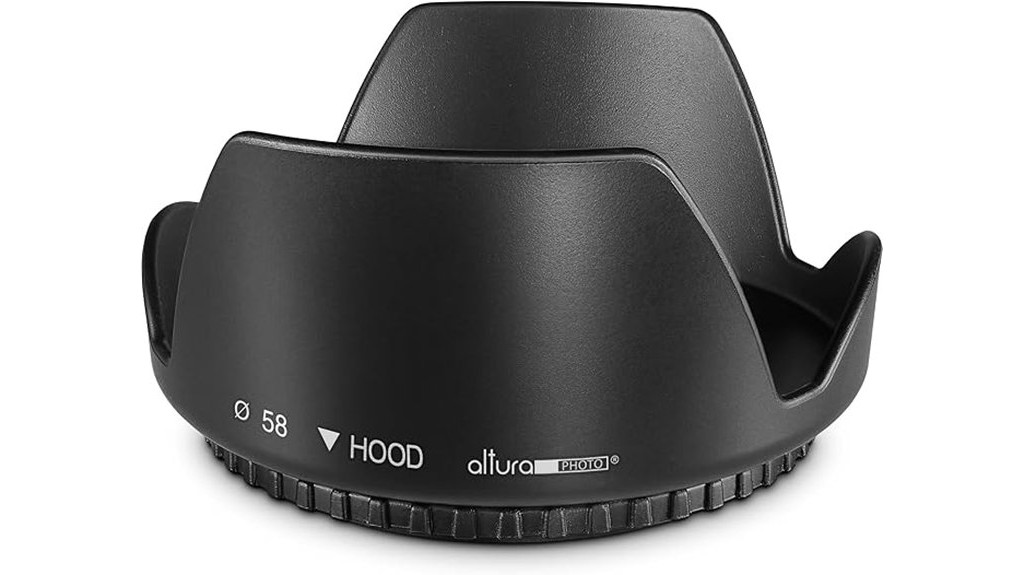
For Canon DSLR owners, the Altura Photo 58MM Tulip Flower Lens Hood is an ideal accessory. It’s compatible with a wide range of Canon EOS DSLRs, including popular models like the 77D, 80D, and Rebel series. The tulip-shaped design effectively blocks stray light, reducing lens flare and improving image quality. At just 0.32 ounces, it’s lightweight yet durable, making it a practical choice. While not suitable for wide-angle shots, the hood performs well with standard and telephoto lenses. With over 5,000 positive reviews and a #1 best-seller ranking, this affordable lens hood is a must-have for Canon users seeking enhanced photographic results.
Best For: Canon DSLR owners looking for an affordable, lightweight, and effective lens hood to reduce lens flare and improve image quality.
Pros:
- Compatible with a wide range of popular Canon EOS DSLR models
- Tulip-shaped design effectively blocks stray light
- Lightweight and durable construction at just 0.32 ounces
Cons:
- Not suitable for wide-angle shots, may cause vignetting
- Limited to 52mm lens thread size
- Non-reversible design
https://www.amazon.com/dp/B00IV2JE1A
Canon EF 75-300mm f/4-5.6 III Lens Bundle
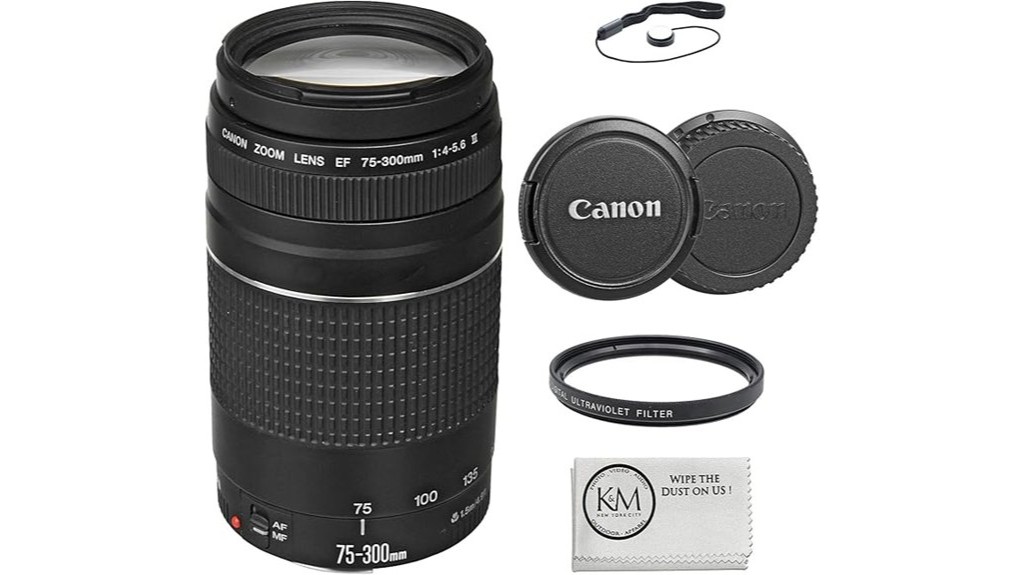
Versatility shines with the Canon EF 75-300mm f/4-5.6 III Lens Bundle, making it a compelling choice for photographers seeking a reliable all-purpose lens. This bundle packs a punch, offering a wide focal range from 75mm to 300mm, perfect for capturing everything from portraits to wildlife. The Super Spectra Coating guarantees crisp, clear images, while the 7-blade diaphragm delivers smooth, professional-grade bokeh. With a DC Micro Motor AF system and an aperture range of f/4 to f/45, this lens is well-equipped to handle a variety of shooting conditions. Paired with the included accessories like the UV filter and microfiber cloth, the Canon EF 75-300mm f/4-5.6 III Lens Bundle is a versatile and reliable option for photographers.
Best For: Photographers looking for a versatile all-purpose lens with a wide focal range and reliable performance.
Pros:
- Extensive 75-300mm focal range for capturing a variety of subjects
- Super Spectra Coating for crisp, clear images
- 7-blade diaphragm for smooth, professional-grade bokeh
Cons:
- Aperture range may not be as fast as some other telephoto lenses
- Heavier weight compared to some compact telephoto options
- Limited compatibility with newer EOS R/RF mount cameras
https://www.amazon.com/dp/B0CG7WS1K9
Canon RF100-400mm F5.6-8 is USM Black
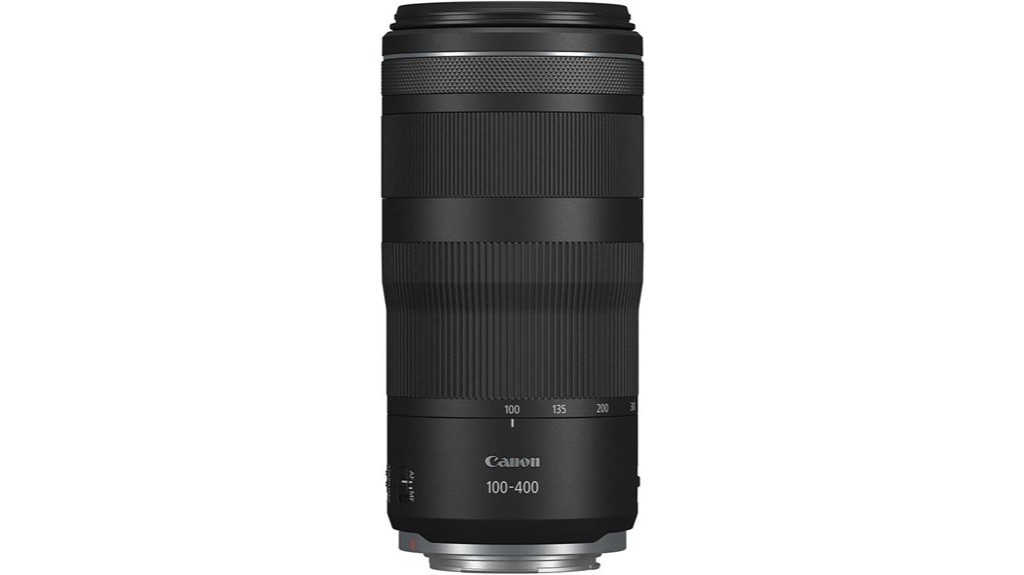
Photographers seeking a compact, high-quality telephoto zoom lens will find the Canon RF100-400mm F5.6-8 is USM Black an excellent choice. This versatile RF lens boasts a 100-400mm zoom range, delivering impressive reach and flexibility. Its compact, lightweight design makes it easy to carry, while Canon’s Nano USM technology guarantees smooth, quiet autofocus. Benefiting from up to 5.5 stops of optical image stabilization, or 6 stops when paired with EOS R cameras, you’ll capture crisp, blur-free shots even in challenging light. Handy control features like the customizable control ring further enhance your creativity. With a minimum focus distance of 2.89 feet and 0.41x maximum magnification, the RF100-400mm is a compelling telephoto option for EOS R system users.
Best For: Photographers seeking a compact, high-quality telephoto zoom lens for their EOS R system cameras.
Pros:
- Versatile 100-400mm zoom range
- Compact, lightweight design
- Optical image stabilization up to 6 stops
Cons:
- Maximum aperture range of f/5.6-8 may limit low-light performance
- Relatively slow autofocus compared to some other RF lenses
- Higher price point compared to some other telephoto zoom options
https://www.amazon.com/dp/B09FFV6WF5
Canon RF24-70mm F2.8 L is USM Lens for EOS R Series Mirrorless Cameras
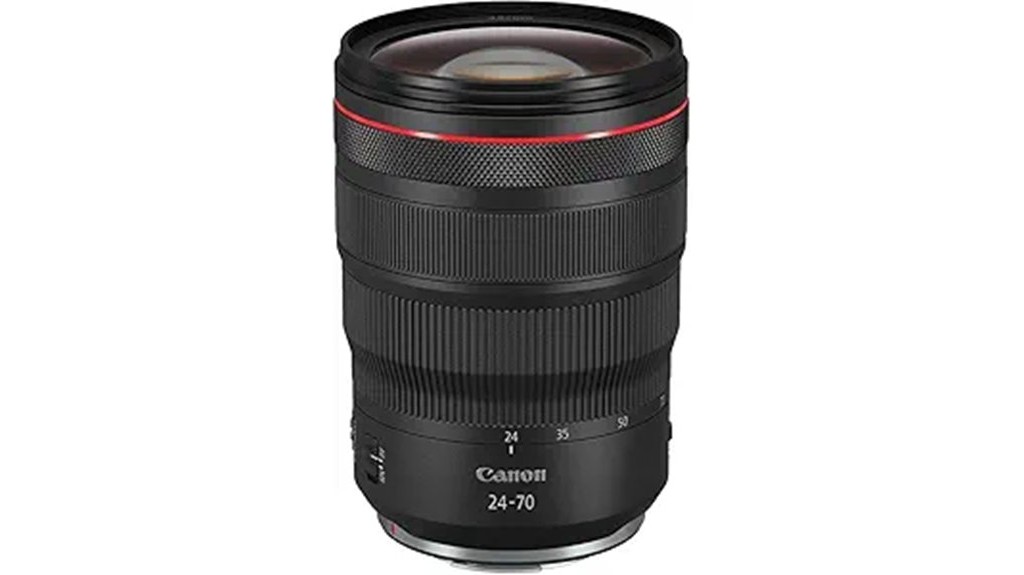
If you’re seeking a premium standard zoom lens for your Canon EOS R series mirrorless camera, the Canon RF24-70mm F2.8 L is USM lens delivers exceptional optical performance. This compact and lightweight L-series lens boasts a bright f/2.8 aperture, providing stunning image quality with excellent sharpness and clarity. Its dust- and weather-resistant construction guarantees reliable performance, even in challenging conditions. The Nano USM autofocus system offers smooth, quiet, and high-speed operation, while the customizable control ring allows for direct setting changes. With up to 5 stops of image stabilization and reduced focus breathing, this lens is a versatile choice for a wide range of photographic applications.
Best For: The Canon RF24-70mm F2.8 L is USM lens is best for Canon EOS R series mirrorless camera owners seeking a versatile standard zoom lens with exceptional optical performance and professional-grade features.
Pros:
- Delivers high image quality with excellent sharpness and clarity
- Compact and lightweight L-series lens design
- Provides up to 5 stops of image stabilization
Cons:
- More expensive than some third-party standard zoom lens options
- Relatively heavy compared to some other RF mount lenses
- May be overkill for casual or hobbyist photographers
https://www.amazon.com/dp/B07WQ54BL8
Tamron 17-70mm f/2.8 Di III-A VC RXD Lens for Sony E APS-C Mirrorless Cameras
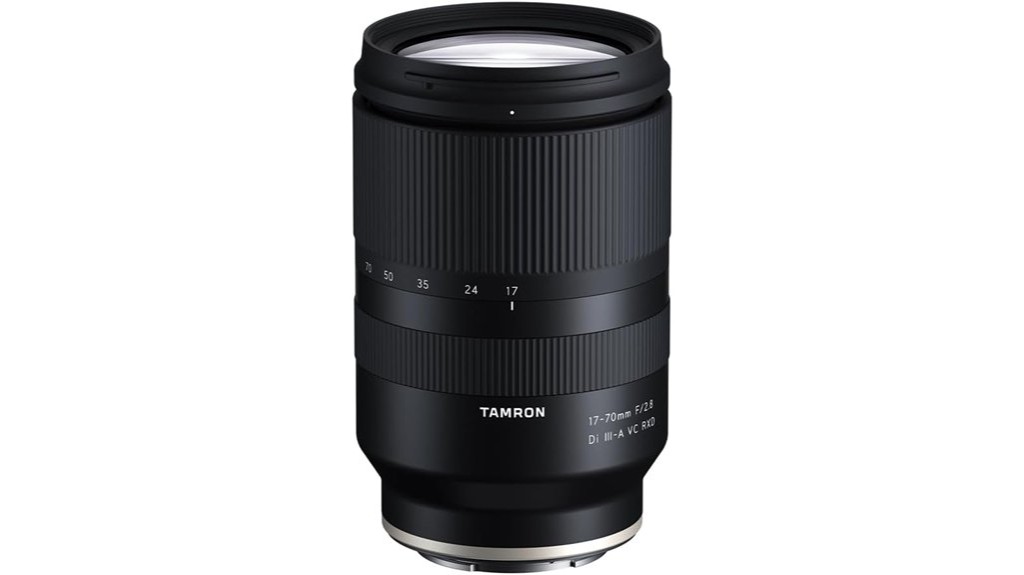
The Tamron 17-70mm f/2.8 Di III-A VC RXD lens is a remarkable choice for APS-C mirrorless camera owners seeking a high-performance standard zoom lens. Its impressive 4.1x zoom range, outstanding optical quality, and advanced image stabilization make it a versatile tool for capturing stunning, professional-grade photos. The lens’s moisture-resistant construction and close focusing capability further enhance its appeal, while the positive customer reviews and high sales rank demonstrate its market-leading status. Whether you’re shooting landscapes, portraits, or everyday moments, the Tamron 17-70mm delivers exceptional results that will elevate your photography to new heights.
Best For: The Tamron 17-70mm f/2.8 Di III-A VC RXD lens is best for APS-C mirrorless camera owners who want a versatile, high-performance standard zoom lens with excellent optical quality and advanced image stabilization.
Pros:
- Impressive 4.1x zoom range covering a wide variety of shooting situations
- Outstanding optical performance with advanced lens elements
- Effective image stabilization for sharp, blur-free photos and videos
Cons:
- Heavier and larger than some other standard zoom lenses for APS-C cameras
- May be outside of some users’ budgets compared to more basic lens options
- Autofocus performance may not be as fast as some higher-end lenses
https://www.amazon.com/dp/B08PFNNKCC
Canon EF 75-300mm f/4-5.6 III Telephoto Zoom Lens for Canon SLR Cameras (Renewed)
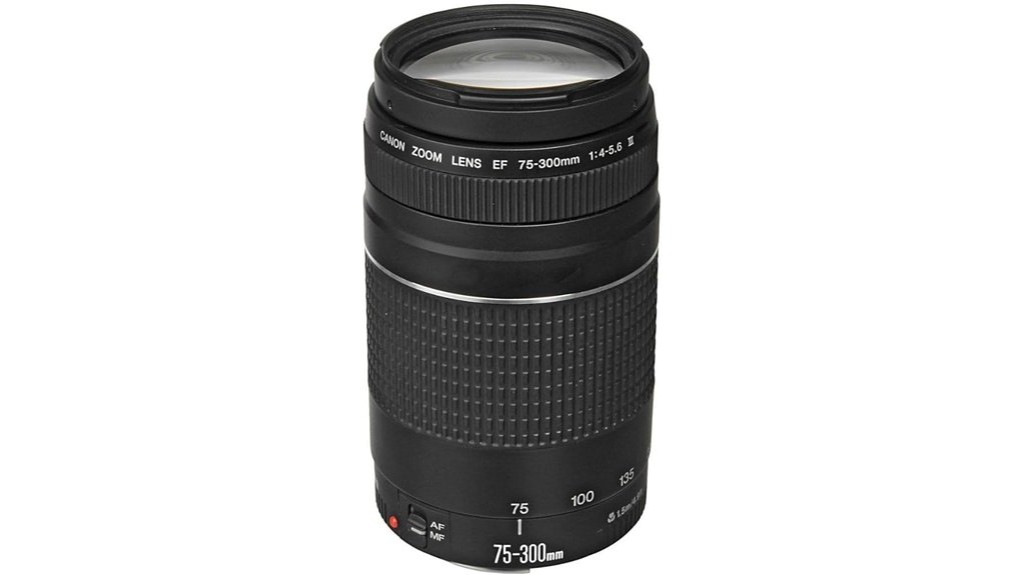
With its lightweight glass material, Micro USM autofocus, and optical image stabilization, the Canon EF 75-300mm f/4-5.6 III Telephoto Zoom Lens is an excellent choice for those seeking a versatile and high-performing telephoto lens for their Canon SLR cameras. The lens offers a focal range of 75-300mm, covering a wide range of shooting scenarios from portraits to wildlife. Its compact and lightweight design, measuring just 2.8 inches in diameter and 4.8 inches long, makes it easy to carry around. The smooth zooming mechanism and silver ring on the front part of the zoom ring add to the lens’s premium feel and functionality.
Best For: Photographers looking for a versatile telephoto zoom lens with optical image stabilization and a compact, lightweight design for their Canon SLR cameras.
Pros:
- Lightweight glass material for easy handling
- Micro USM autofocus for quick and quiet focusing
- Optical image stabilization for sharp shots
Cons:
- Relatively narrow maximum aperture range of f/4-5.6
- Image quality may not be as sharp as more expensive telephoto lenses
- Autofocus may struggle in low light conditions
https://www.amazon.com/dp/B06XP4Z2M7
Canon RF70-200mm F2.8 L is USM Lens for EOS R Series Mirrorless Cameras
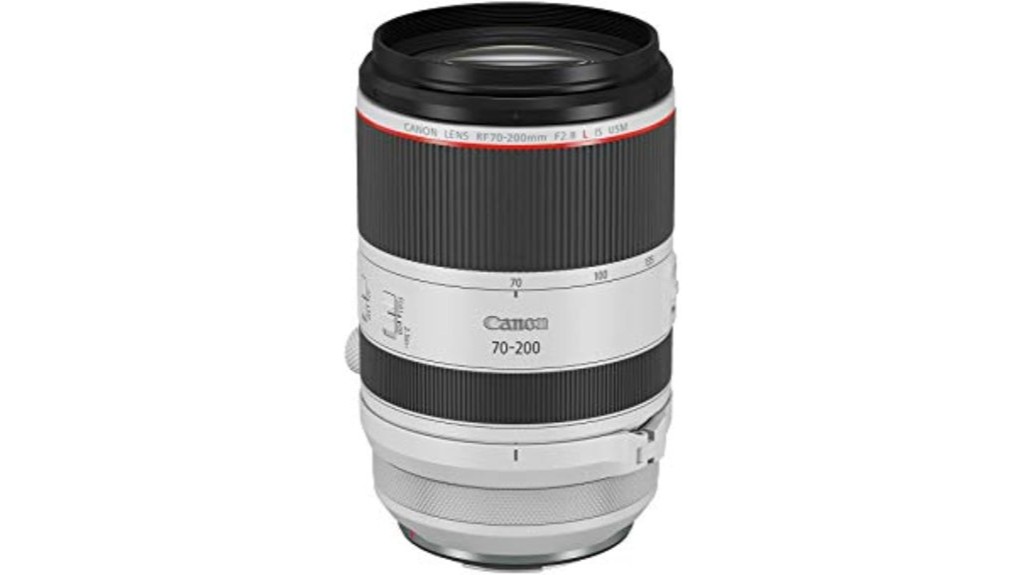
Photographers seeking a high-quality telephoto zoom lens for their Canon EOS R series mirrorless cameras will find the Canon RF70-200mm F2.8 L IS USM lens an excellent choice. This lens boasts a bright F2.8 aperture, delivering stunning image quality and low-light performance. Its compact, lightweight design and optical image stabilization make it easy to capture sharp, handheld shots. The dual Nano USM autofocus system guarantees fast, smooth, and quiet focusing, perfect for video and still photography. With a minimum focusing distance of 2.3 feet, this lens offers impressive versatility. No wonder it’s ranked among the best-selling SLR camera lenses.
Best For: Photographers seeking a high-quality telephoto zoom lens for their Canon EOS R series mirrorless cameras.
Pros:
- High image quality and bright f/2.8 aperture
- Compact and lightweight design
- Optical image stabilization with up to 5 Stops of shake correction
Cons:
- Relatively expensive compared to some other telephoto zoom lenses
- May be too large and heavy for some users
- Not compatible with non-Canon EOS R series mirrorless cameras
https://www.amazon.com/dp/B07Z5M9M7M
Tamron 70-300mm F/4.5-6.3 Di III RXD for Sony Mirrorless Cameras
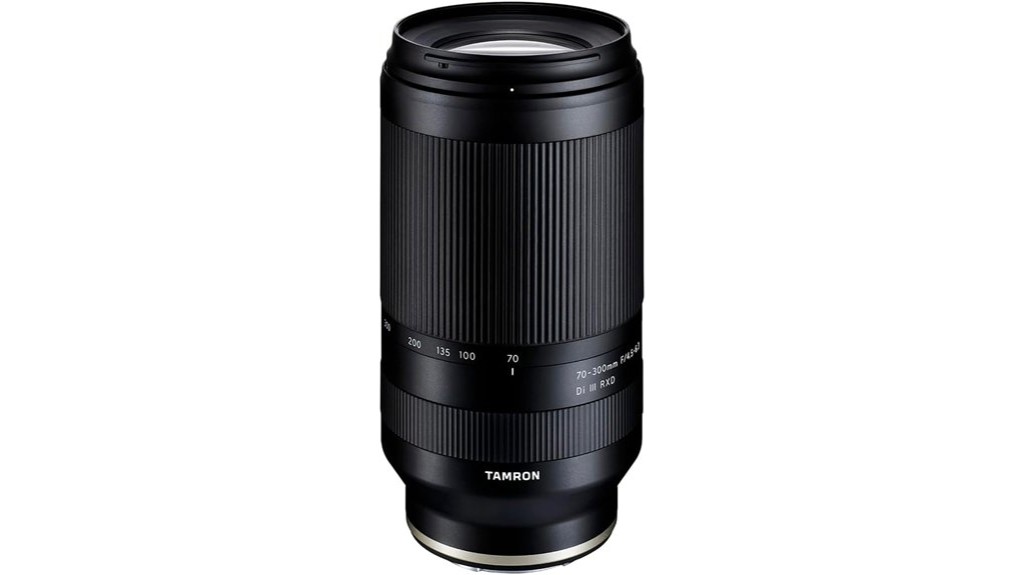
For Sony mirrorless camera owners seeking a versatile telephoto zoom lens, the Tamron 70-300mm F/4.5-6.3 Di III RXD stands out as an impressive choice. Boasting the world’s smallest size and lightest weight, this lens offers an equivalent field-of-view of 105-450mm on APS-C cameras, making it perfect for capturing landscapes, sports, wildlife, and more. The RXD autofocus unit guarantees quiet, precise performance, while the impressive optical design delivers stunning image quality with beautiful bokeh. Weighing just 19.2 ounces, this compact and lightweight lens is a convenient companion for any adventure, whether you’re traveling or shooting on the go.
Best For: Sony mirrorless camera owners seeking a versatile telephoto zoom lens for a variety of photography applications like landscapes, sports, wildlife, and more.
Pros:
- Extremely compact and lightweight design
- Impressive image quality with beautiful bokeh
- Quiet and precise autofocus performance
Cons:
- Maximum aperture range of f/4.5-6.3 may not be ideal for low light situations
- Limited zoom range compared to some other telephoto zoom lenses
- Manual focus ring could feel a bit too smooth/sensitive for some users
https://www.amazon.com/dp/B08K3MXZCZ
High-Power Telephoto Zoom Lens for Canon DSLR Cameras
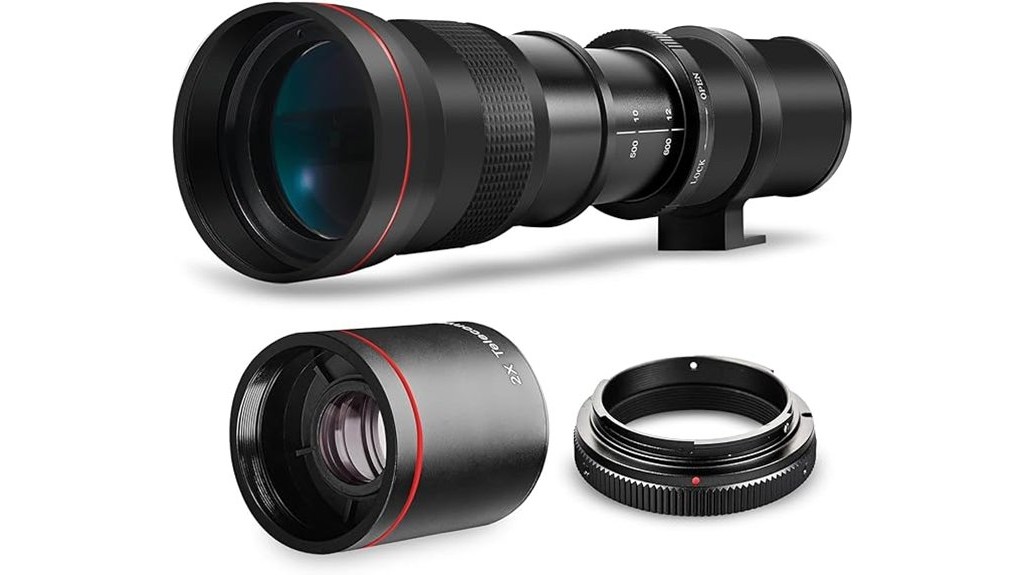
This 420-1600mm high-power telephoto zoom lens is an ideal choice for avid wildlife and sports photographers seeking a versatile and powerful lens. With a 2X Teleconverter that doubles the lens power to 1600mm, you’ll capture clear, long-distance shots with enhanced photographic flexibility. The sophisticated f/8.3 aperture delivers detailed and crisp photos, while the EF-mount compatibility safeguards attachment and superior picture quality. Compatible with a wide range of Canon DSLR models, this lens offers the performance you need to take your photography to new heights.
Best For: Avid wildlife and sports photographers seeking a versatile and powerful telephoto zoom lens for their Canon DSLR camera.
Pros:
- Powerful 420-1600mm focal range with 2X Teleconverter
- Sophisticated f/8.3 aperture for detailed and crisp photos
- Compatible with a wide range of Canon DSLR models
Cons:
- Bulky and heavy design may be cumbersome for some users
- Relatively expensive compared to other telephoto lens options
- Aperture may not be fast enough for low-light situations
https://www.amazon.com/dp/B017JF8MIU
85mm f1.8 Portrait Lens for Canon EF Mount
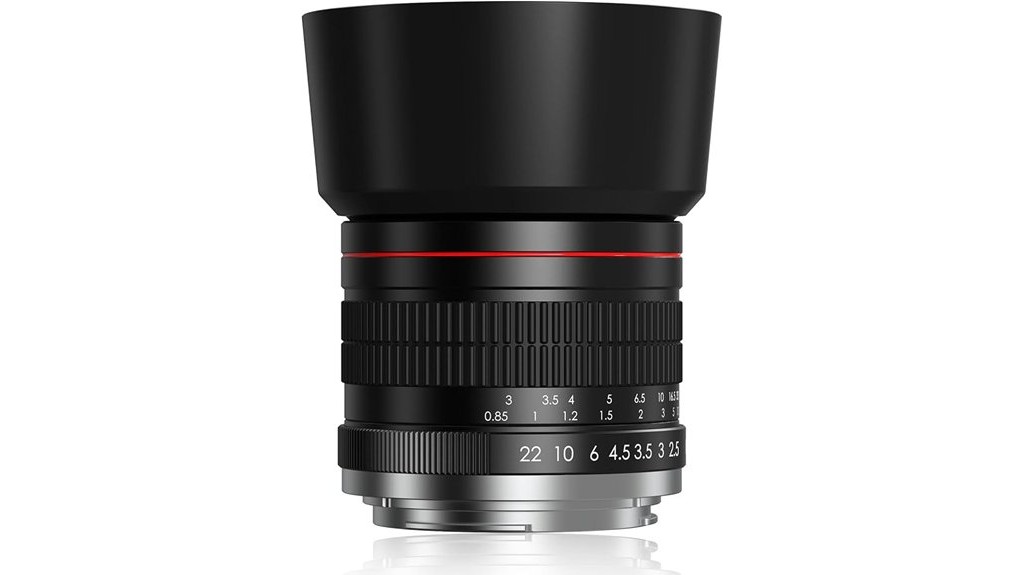
If you’re a portrait or street photographer looking to capture stunning images with a shallow depth of field, the 85mm f1.8 manual focus lens for the Canon EF mount is an excellent choice. Featuring a large f1.8 aperture, this lens delivers beautifully blurred backgrounds and impactful subject isolation. The 85mm focal length is ideal for half-body and full-body shots, as well as close-ups. Though manual focus, the lens provides precise control over focus, allowing you to effortlessly nail focus. Compatible with a wide range of Canon DSLR cameras, this portable yet powerful lens is a must-have for any serious photographer.
Best For: Portrait and street photographers looking to capture stunning images with a shallow depth of field.
Pros:
- Large f1.8 aperture for beautiful bokeh and subject isolation
- 85mm focal length ideal for half-body, full-body, and close-up shots
- Manual focus provides precise control over focus
Cons:
- Requires manual focusing, which may not be as convenient as autofocus
- Heavier and larger than some other portrait lenses
- May not be suitable for some fast-paced or action-oriented photography
https://www.amazon.com/dp/B0CL255NSY
EF 85mm f1.8 Portrait Lens for Canon EOS DSLR Cameras
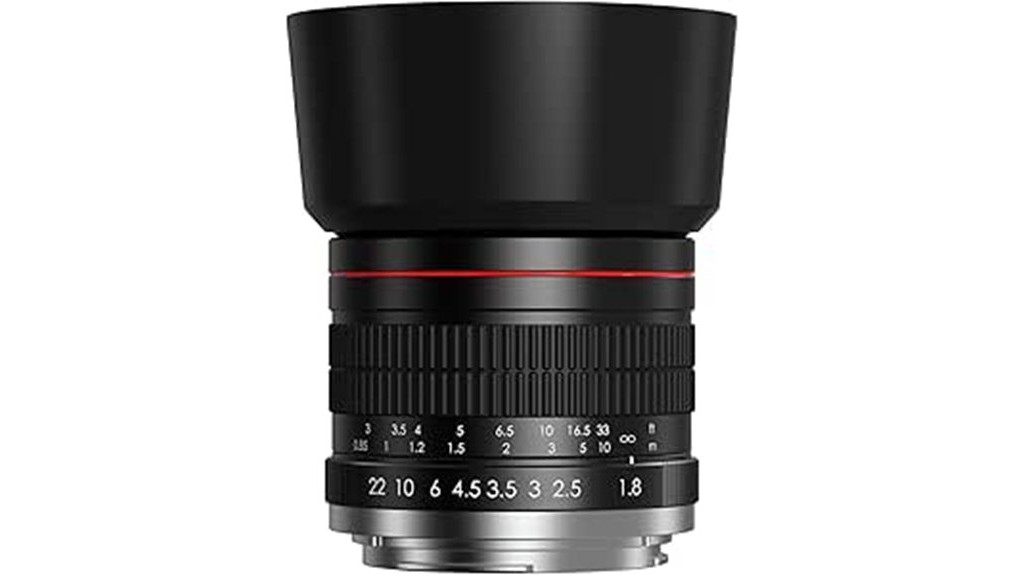
Are you a portrait photographer seeking a lens that offers exceptional image quality and creative control? The EF 85mm f/1.8 Portrait Lens for Canon EOS DSLR Cameras is a versatile and manual focus option that delivers. Crafted with hybrid aspherical elements and advanced coatings, this lens reduces aberrations and glare, delivering unparalleled clarity. Its fast f/1.8 aperture creates dreamy bokeh, letting you isolate your subject for stunning portrait shots. The smooth, large focus ring provides precise control, while the internal focus mechanism guarantees quiet, speedy performance. Compatible with a wide range of Canon DSLRs, this lens is a must-have for any portrait pro.
Best For: Portrait photographers seeking exceptional image quality and creative control with a manual focus lens.
Pros:
- Produces dreamy bokeh with its fast f/1.8 aperture
- Reduces aberrations and glare for unparalleled clarity
- Smooth, large focus ring provides precise control
Cons:
- Requires manual focus, which may not be ideal for some users
- No autofocus capabilities
- May not be compatible with all Canon DSLR camera models
https://www.amazon.com/dp/B00VZYR2LA
Canon RF50mm F1.8 STM Lens for EOS R Series Mirrorless Cameras
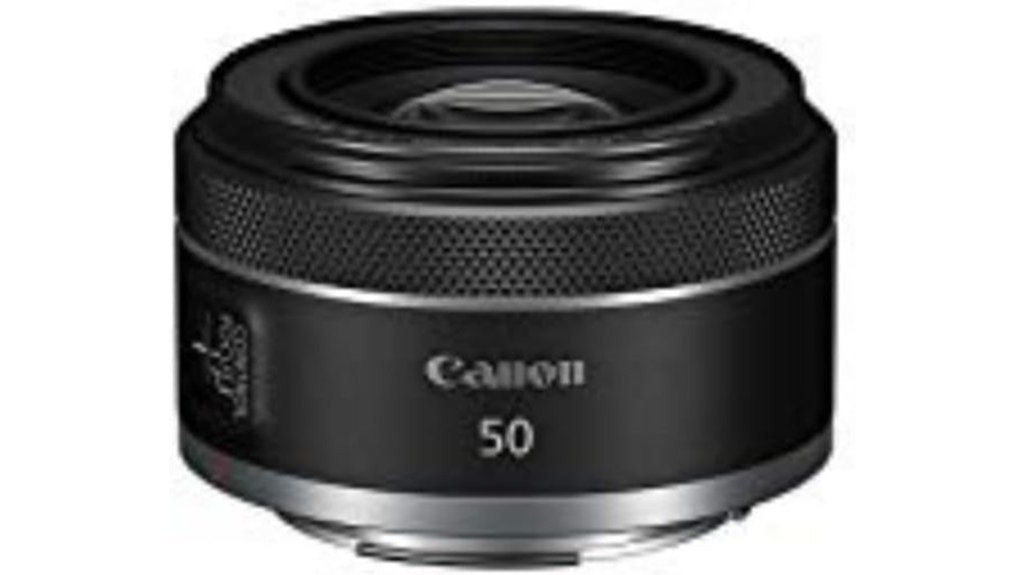
For photographers seeking a compact, lightweight prime lens that delivers exceptional image quality, the Canon RF50mm F1.8 STM Lens is an outstanding choice. Boasting a large F1.8 aperture, this lens excels in low-light conditions and provides a stunning bokeh effect for creative portraits. Its Stepping Motor (Gear-Type STM) guarantees smooth and quiet continuous autofocus, making it ideal for both stills and video. The control ring offers direct access to settings, while optimized lens placement and coatings minimize ghosting and flare. Compatible with the full EOS R mirrorless camera lineup, this affordable prime lens is a must-have for photographers seeking professional-grade results.
Best For: Photographers seeking a compact, high-quality prime lens for low-light photography and creative portraiture with their EOS R series mirrorless camera.
Pros:
- Large F1.8 aperture for excellent low-light performance and beautiful bokeh
- Smooth and quiet continuous autofocus thanks to the Stepping Motor (Gear-Type STM)
- Compact and lightweight design
Cons:
- Manual focus ring could feel more premium
- No weather sealing
- No optical image stabilization
https://www.amazon.com/dp/B08MFVH7SV
3 in 1 Cell Phone Camera Lens Kit for Smartphones
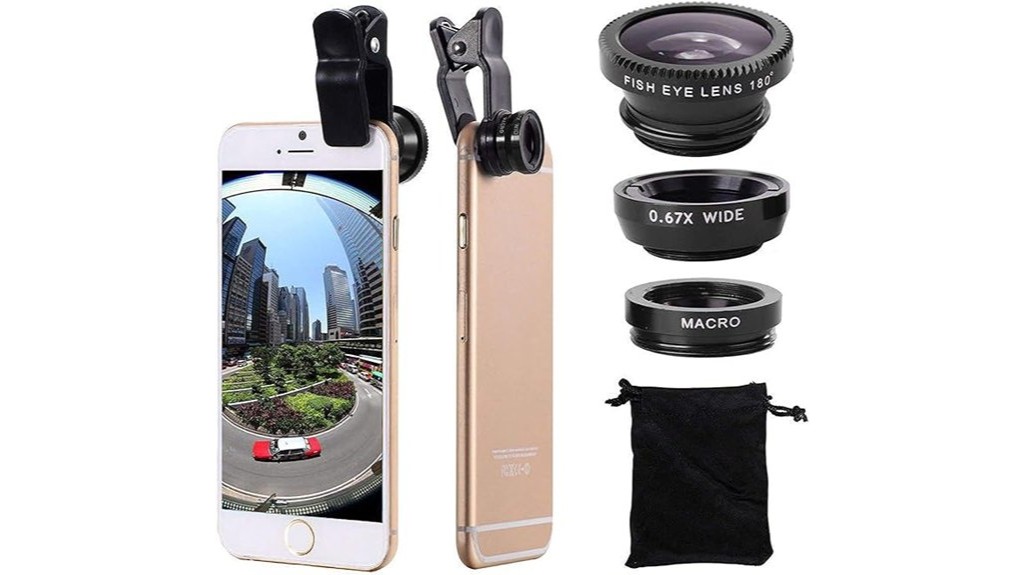
The 3 in 1 Cell Phone Camera Lens Kit for Smartphones is an exceptional choice for any smartphone user seeking to expand their photographic capabilities. Its universal compatibility guarantees seamless integration with most smartphones, while the high-quality aluminum construction provides durability. The easy-to-use clip-on lens design and detachable, portable clamps with soft rubber make it a breeze to switch between the wide-angle, macro, and fisheye lenses. Whether you’re capturing breathtaking landscapes or intricate close-up details, this kit delivers impressive results, thanks to its ability to work with dual camera systems. Priced affordably and backed by solid customer reviews, this 3-in-1 lens kit is a must-have accessory for any smartphone photographer.
Best For: Smartphone users looking to expand their photographic capabilities with a versatile 3-in-1 lens kit that is easy to use and compatible with most devices.
Pros:
- Universal compatibility with most smartphones
- Durable aluminum construction
- Versatile lens options (wide-angle, macro, fisheye)
Cons:
- May not fit some larger smartphone cases
- Image quality may not be as high as dedicated cameras
- Some users report difficulty attaching the lenses
https://www.amazon.com/dp/B08PBH52Q8
Factors to Consider When Choosing Camera Lenses
When choosing camera lenses, you’ll need to ponder lens mount compatibility, the focal length that suits your needs, the aperture and resulting bokeh, and whether image stabilization is essential. Additionally, your budget and the overall value of the lens will be critical factors. Let’s explore these considerations in more detail.
Lens Mount Compatibility
Choosing the right lens mount is imperative when selecting camera lenses. Camera lenses are designed for specific camera systems, so ensuring lens mount compatibility between the lens and the camera body is indispensable. Incompatible mounts can prevent the lens from attaching or result in poor image quality and functionality. DSLR cameras use common mounts like Canon EF, Nikon F, Sony E, and Micro Four Thirds, while mirrorless cameras often have proprietary mounts like Canon RF, Nikon Z, and Sony E, which may not work with DSLR lenses. Adapters can sometimes bridge the gap, but compatibility and performance may be affected. Understanding lens mount requirements is essential for selecting the right camera lenses for your needs.
Focal Length Selection
Focal length is perhaps the most essential factor to ponder when selecting camera lenses. Whether you prefer wide-angles for landscapes, standard lenses for versatility, or telephoto zooms for distant subjects, your choice of focal length will significantly impact your photos. Wide-angles deliver a broad view, standard lenses mimic human vision, and telephotos magnify distant scenes. Consider the intended use, available space, and desired framing when selecting the ideal focal length. With a deeper understanding of how focal length shapes your images, you’ll be equipped to choose the perfect lenses for your 2025 photography needs.
Aperture and Bokeh
Aside from focal length, the aperture of a lens is a critical factor to ponder when selecting the best camera lenses for your needs in 2025. Aperture controls the amount of light entering the camera, with larger apertures like f/1.8 allowing more light and creating a shallower depth of field for a more blurred background. This “bokeh” effect can produce a visually striking, professional-looking image, especially in portrait photography. Additionally, the size of the aperture, represented by the f-number, determines the ratio of focal length to aperture diameter. Mastering aperture and bokeh is essential for achieving your desired depth of field and aesthetic in your photographs.
Image Stabilization Needs
While selecting the best camera lenses for your needs in 2025, image stabilization is an essential factor to ponder. Optical image stabilization (OIS) in the lens outperforms in-body image stabilization (IBIS) for reducing camera shake, especially when using long telephoto lenses or shooting in low light. High-end lenses may offer up to 5 stops or more of shake reduction. However, in-lens stabilization may not be as effective for video recording compared to IBIS. When using a tripod, you should turn off image stabilization to avoid potential issues. Considering the varied stabilization capabilities of lenses can help you choose the right optics for capturing sharp, professional-grade photos.
Budget and Value
When selecting camera lenses, setting a realistic budget and prioritizing value is essential. Consider the cost per feature, like aperture, focal length, and image stabilization, to find a lens that fits your needs and budget. Refurbished or used lenses from reputable sources can offer significant savings compared to new ones. Evaluating a lens’s long-term versatility and potential for future use is pivotal. Exploring third-party options, which often provide similar performance at lower prices, can be an excellent strategy for budget-conscious photographers. By balancing your budget and focusing on value, you can capture stunning, professional-grade photos without breaking the bank.
Frequently Asked Questions
What Factors Determine the Price of Camera Lenses?
The price of camera lenses is determined by several factors. The quality of the lens materials, the complexity of the lens design, the brand reputation, and the level of technology all play a role. More advanced features like image stabilization, weather sealing, and specialty coatings will also increase the cost. Ultimately, you’re paying for the performance and durability that high-end lenses provide, allowing you to capture stunning, professional-grade photos.
How Can I Clean and Maintain My Camera Lenses?
To keep your camera lenses in top shape, start by using a soft, microfiber cloth to gently wipe the surface. Avoid using paper towels or tissues, as they can scratch the lens. For tougher grime, use a lens cleaning solution and a lint-free cloth. Never touch the glass directly with your fingers. Store your lenses in a cool, dry place and use lens caps to protect them when not in use. With proper maintenance, your lenses will last for years.
What Is the Difference Between Prime and Zoom Lenses?
Prime and zoom lenses offer different capabilities. Prime lenses have a fixed focal length, providing superior image quality and a wider aperture for better low-light performance. In contrast, zoom lenses allow you to adjust the focal length, offering more versatility in framing your shots. The choice between the two depends on your photography needs – whether you prioritize image quality or flexibility.
How Do I Choose the Right Lens for My Camera?
Choosing the right lens is like traversing the currents of life – you need to ponder your destination and the conditions you’ll face. Prime lenses are steady ships, offering sharper images, while zoom lenses are versatile explorers, adapting to your needs. Assess your photography goals, lighting conditions, and budget. Then, set sail with the lens that will capture your vision most effectively. Trust your instincts, and let the lens lead you to stunning, professional-grade photos.
Can I Use Third-Party Lenses With My Camera?
You certainly can use third-party lenses with your camera. Compatibility is key, so guarantee the lens mount matches your camera body. Third-party lenses often offer more affordable alternatives to manufacturer-branded options without sacrificing quality. Just research brands and models carefully to find the right fit for your needs and budget. With the right third-party lens, you can open up new creative possibilities and capture stunning, professional-grade photos.
Conclusion
When selecting camera lenses, you’ll want to examine factors like aperture, focal length, and compatibility with your camera model. One interesting statistic is that in 2025, the global camera lens market is expected to reach $25.6 billion, indicating the continued importance of high-quality optics for capturing stunning, professional-grade photos.

Maria is brilliant when it comes to creating beautiful and functional spaces. Maria has an exceptional ability to understand your needs and desires, translating them into tailored solutions that reflect your personality and lifestyle. Whether you’re seeking advice on home decor, looking to upgrade your interior, or seeking inspiration to enhance your quality of life through design, Maria can help you achieve your goals. With Maria by your side, your vision for the perfect home is within reach.
